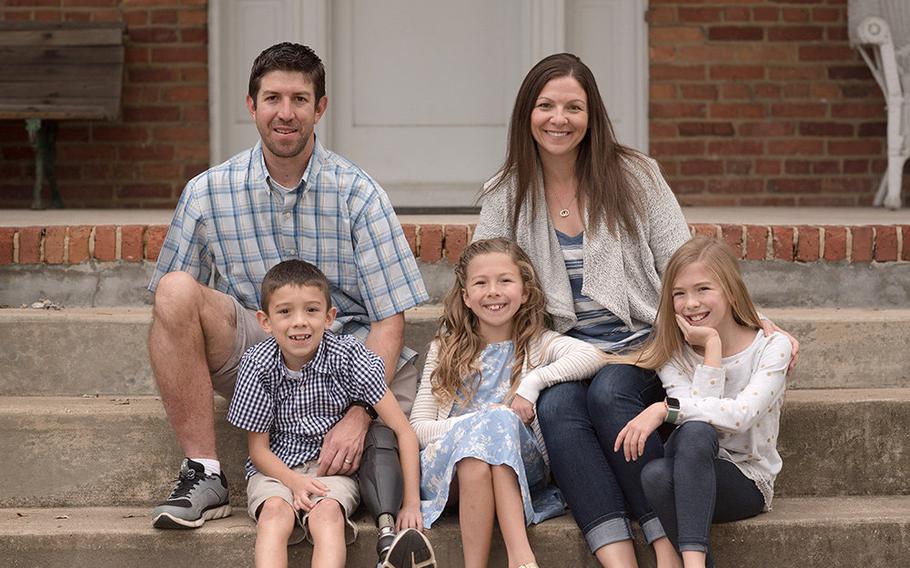
Retired Army Capt. Ryan Kules with his wife Nancy and their children Jillian, Liv and Evan. Injured by a roadside bomb in 2005, Kules lost his right arm above the elbow and his left leg above the knee. He now works with Wounded Warrior Project and helped push for new legislation to get more government funding for disabled veterans to modify their homes. ( Photo courtesy Ryan Kules.)
A bill to increase the amount of funding available to disabled veterans to adapt their homes to meet their needs is one step closer to becoming law.
The Ryan Kules Specially Adaptive Housing Improvement Act of 2019 passed the House on Tuesday night by a voice vote.
The bill, introduced by Reps. Mike Levin, D-Calif., and Gus Bilirakis, R-Fla., updates the Department of Veterans Affairs’ Specially Adapted Housing grant program, which now provides a maximum of $85,000 to veterans with certain permanent, service-connected disabilities, with the most common being bilateral amputees. The new law ups the amount of the grant to about $90,000 and allows veterans to receive funds up to six times.
Following the vote, former Army Capt. Ryan Kules, for whom the legislation is named, said it was “a great step toward ensuring wounded veterans have access to flexible resources to adapt their homes, which helps meet their changing needs throughout life.”
Kules is a double-amputee who works as the Wounded Warrior Project director of combat stress recovery. His testimony in Congress last year about his own challenges to adapt a home to accommodate his wheelchair helped lawmakers craft the bill.
He said the VA grant that he received about 10 years ago did not cover the full cost of projects that included widening hallways and doorways, building a wheelchair ramp and lowering countertops in his home. Then, when his family grew, and he moved to a new home, he was responsible for the cost of adapting the new house.
Accessing the grant multiple times also allows for veterans to renovate their homes as their needs shift with age. Kules primarily uses a prosthetic leg now but imagines he will rely more on his wheelchair as he gets older.
“The proposed changes will reduce financial stress for families like mine who use or need the Specially Adapted Housing benefit, and it will give them more peace of mind, freedom, and comfort in their homes. I’m grateful for the representatives who supported this act, and I look forward to its swift passage in the Senate,” Kules said in a prepared statement.
The bill was introduced in the Senate as the Paul Benne Specially Adaptive Housing Improvement Act of 2019 by Sens. Jerry Moran, R-Kan., and Kyrsten Sinema, D-Ariz. A hearing has not been scheduled for the Senate bill and, as the budget deadline approaches, it is unclear whether the bill will see the same success as it did in the House.
The House bill was amended to include legislation that Levin introduced to extend eligibility for the Fry Scholarship to spouses and children of members of the National Guard and Reserve who died of service-connected causes but whose deaths did not occur when the member was on active duty.
“Servicemembers make incredible sacrifices for our freedom, and it is our responsibility to support them when they return home — particularly when they return with wounds from their service,” Levin said in a prepared statement. “The Specially Adapted Housing program is a critical tool we have to ensure that veterans have homes that fit their abilities, and improving the program will significantly raise their quality of life.”
Thayer.rose@stripes.com Twitter: @Rose_Lori